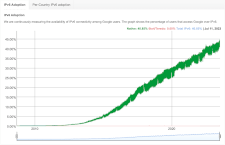IPv6
Stands for "Internet Protocol version 6."
IPv6 is the most recent version of the Internet Protocol (IP). It provides an identification and location system for internet-connected devices, assigning IP addresses to devices that help network equipment route traffic. IPv6 is gradually replacing the previous standard, IPv4, and resolves the problem of IPv4 address exhaustion.
Every internet-connected device needs an IP address for identification that other devices can use to send it data. IPv4 uses 32-bit addresses, which allows for almost 4.3 billion unique addresses. While this was sufficient in the early days of the Internet, there are now far more internet-connected devices than possible IPv4 addresses. IPv6 instead uses 128-bit addresses, providing enough address space for 340 undecillion (or 340 trillion trillion trillion) unique IP addresses — enough to be effectively limitless.
An IPv6 address consists of 8 groups of 4 hexadecimal digits, which is longer and more complex than an IPv4 address. For example, compare a simple IPv4 address like 192.168.0.47 to a more complex IPv6 address:
2001:0db8:85a3:0000:0000:8a2e:0370:7334
In addition to vastly increasing the available address space, IPv6 adds several other improvements to the IP protocol. It includes built-in support for IPsec security and multicast data flows (both optional features in IPv4). IPv6 uses a simpler packet header to reduce processing overhead during routing. It also simplifies the auto-configuration of network addresses to make it easier for devices to join networks. Finally, it reduces the need for NAT on local networks, which improves reliability for services like VoIP telephony.
IPv6 Adoption
The rollout of IPv6 began in the mid-2000s as software makers added support to operating systems and network infrastructure. DNS server support began in some countries in 2004. By 2008 it was possible to resolve any domain name using IPv6, and several large companies permanently enabled IPv6 support on their web servers in 2012. However, many networks still operate using IPv4 as the adoption of IPv6 moves at a gradual pace; as of 2023, nearly half of the traffic to Google uses IPv6, up from only 1.5% a decade earlier.
 Test Your Knowledge
Test Your Knowledge